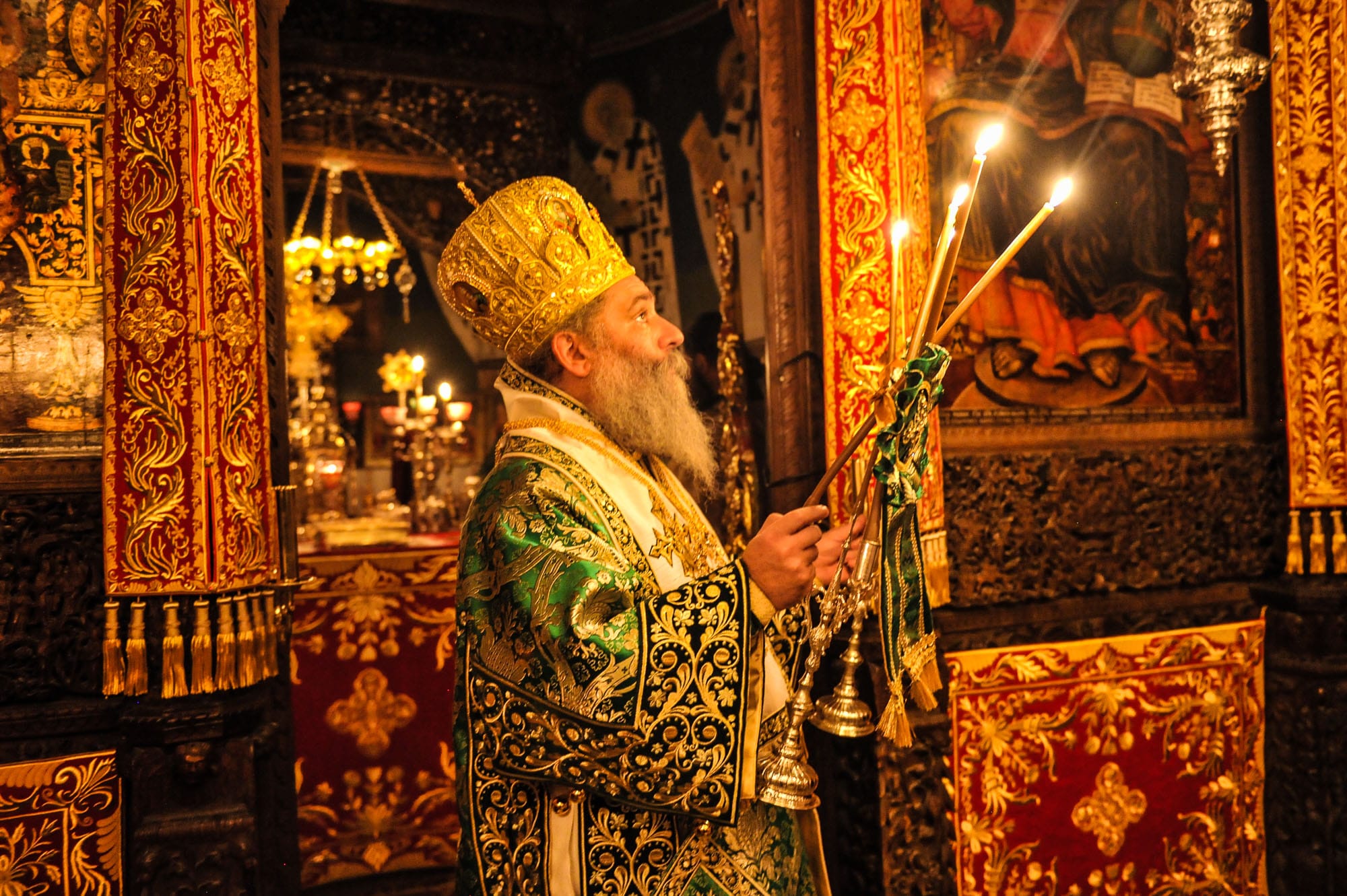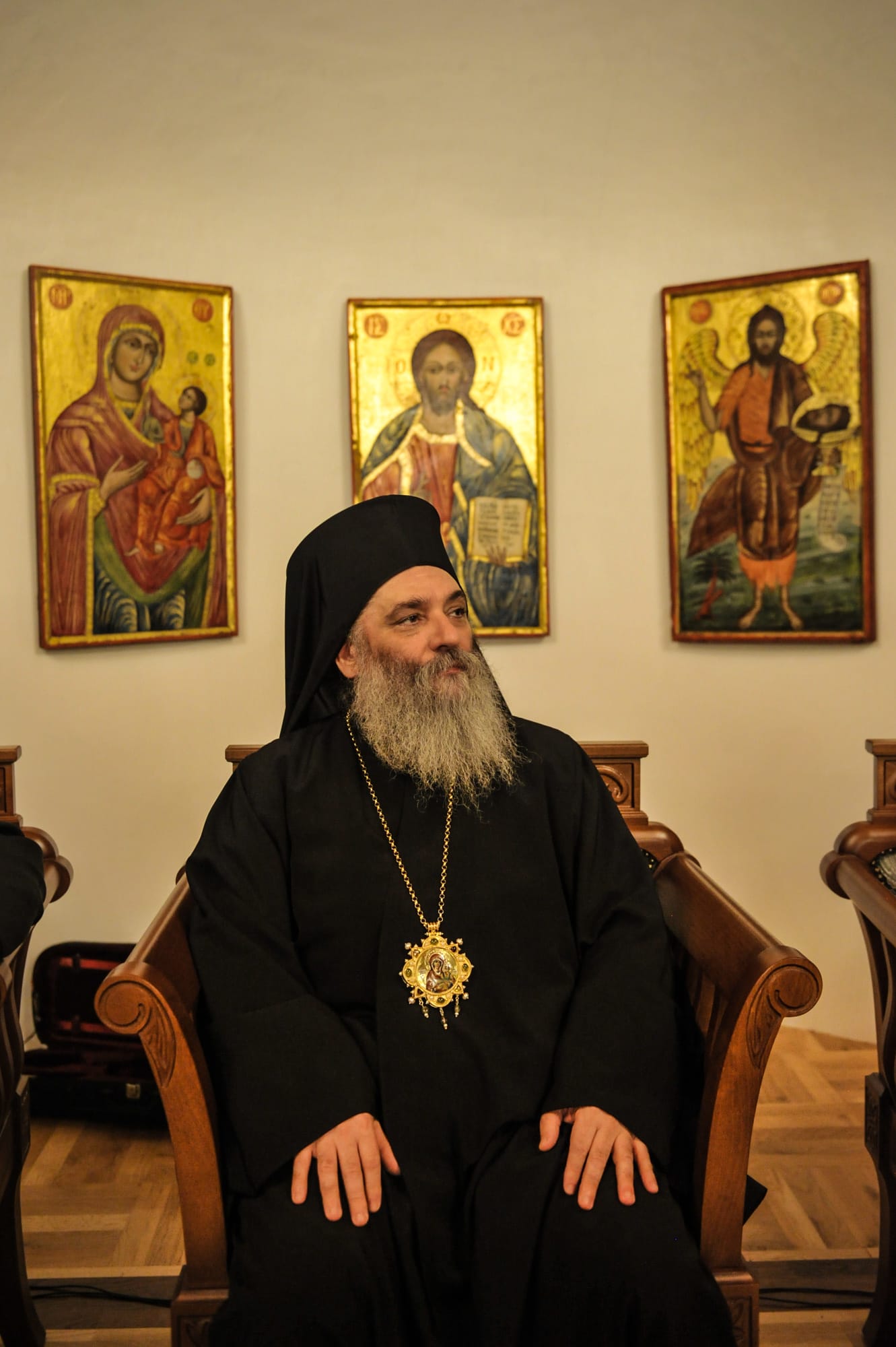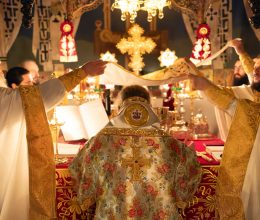A sermon of His Eminence, the Bishop Parthenius, Elder and Abbot of the Bigorski Monastery, uttered at Christmas during the Divine Liturgy, after the reading of the Holy Gospel
Мy dear ones, one of the hymns we chanted tonight in honour of the Nativity of Christ goes as follows: :
Come ye faithful, let us see where Christ was born! Let us follow the path of the Star which led the way of the Wise Men and Eastern Emperors; there, the Angels celebrate Him constantly; the Shepherds played a worthy song, saying: Glory to our Lord on high, peace on Earth and good will among men; addressing the One who was born by a Virgin in a cave at Bethlehem.

 “Come ye faithful, let us see where Christ was born!” – invites the holy hymnographer, summoning us to witness the miracle. He says: “Come”, referring to the multitude, which is very important because it signifies the social aspect, the meaning of the community. He does not say: I will go alone to see and do not care about the others, they can do whatever they want – but invites them all: “Come all” because the news of the Nativity of our Saviour is for everybody: I bring you good tidings of great joy, which shall be to all people (Luke 2,10) –this was the message of the angels. Remember the Gospel and the way the Apostle who got to know Christ went and invited the other one; Apostle Andrew invited his brother Peter, Phillip summoned Nathanael, every disciple of our Lord invited someone else: “I have found the Messiah, come!” This stresses the role of the community, the feeling of togetherness, of sharing, which is necessary for salvation. This means that when I find the truth, I should try and invite the others to this sacred truth. The community is essential for the true knowledge of God and especially pleasing to Him.
In order for us to be witnesses of Christ and kindle His light in someone’s heart, we should first inflame our own heart with the fire of His love. And like we said, we can achieve this only with sincere faith, kindness and simplicity of the pure heart. Let us recollect for a moment the meeting of Nathanael with Christ and the words our Saviour addressed to him: Behold an Israelite indeed, in whom is no guile! (John 1,47) No guile does not mean that he was without sin and never lied. The Lord knoweth the thoughts of man, that they are vanity оспод ги знае човечките мисли, знае дека се тие суетни (Psalm 93,11) and Every man is a liar (Psalm 115,2), says the prophet David who knows a human heart. However, Nathanael was a sincere, authentic person without hypocrisy and devious thoughts and intrigues. For him, black was black, and white was white, a lie was a lie, the truth was the truth. He was a man with a pure and sincere heart before God and before himself. This teaches us to also be truthful, authentic, just; to always try to follow the Divine Justice.
“Come ye faithful, let us see where Christ was born!” In the space and time our Lord, Jesus Christ was born in the town of Bethlehem, which in Hebrew means the home of bread. Symbolically, this meaning refers to the Church of Christ, where every Church is a home of God and the bread is Christ. In the altar of the Church, at the Holy Table, Christ is being born on every Liturgy and is given to us, for our spiritual nourishment and eternal bliss. Not as a corruptive food, but rather as the food and beverage for eternity: I am that bread of life. Your fathers did eat manna in the wilderness, and are dead. This is the bread which cometh down from heaven, that a man may eat thereof, and not die. I am the living bread which came down from heaven: if any man eat of this bread, he shall live for ever: and the bread that I will give is my flesh, which I will give for the life of the world (John 6,48-51).
“Come ye faithful, let us see where Christ was born!” – invites the holy hymnographer, summoning us to witness the miracle. He says: “Come”, referring to the multitude, which is very important because it signifies the social aspect, the meaning of the community. He does not say: I will go alone to see and do not care about the others, they can do whatever they want – but invites them all: “Come all” because the news of the Nativity of our Saviour is for everybody: I bring you good tidings of great joy, which shall be to all people (Luke 2,10) –this was the message of the angels. Remember the Gospel and the way the Apostle who got to know Christ went and invited the other one; Apostle Andrew invited his brother Peter, Phillip summoned Nathanael, every disciple of our Lord invited someone else: “I have found the Messiah, come!” This stresses the role of the community, the feeling of togetherness, of sharing, which is necessary for salvation. This means that when I find the truth, I should try and invite the others to this sacred truth. The community is essential for the true knowledge of God and especially pleasing to Him.
In order for us to be witnesses of Christ and kindle His light in someone’s heart, we should first inflame our own heart with the fire of His love. And like we said, we can achieve this only with sincere faith, kindness and simplicity of the pure heart. Let us recollect for a moment the meeting of Nathanael with Christ and the words our Saviour addressed to him: Behold an Israelite indeed, in whom is no guile! (John 1,47) No guile does not mean that he was without sin and never lied. The Lord knoweth the thoughts of man, that they are vanity оспод ги знае човечките мисли, знае дека се тие суетни (Psalm 93,11) and Every man is a liar (Psalm 115,2), says the prophet David who knows a human heart. However, Nathanael was a sincere, authentic person without hypocrisy and devious thoughts and intrigues. For him, black was black, and white was white, a lie was a lie, the truth was the truth. He was a man with a pure and sincere heart before God and before himself. This teaches us to also be truthful, authentic, just; to always try to follow the Divine Justice.
“Come ye faithful, let us see where Christ was born!” In the space and time our Lord, Jesus Christ was born in the town of Bethlehem, which in Hebrew means the home of bread. Symbolically, this meaning refers to the Church of Christ, where every Church is a home of God and the bread is Christ. In the altar of the Church, at the Holy Table, Christ is being born on every Liturgy and is given to us, for our spiritual nourishment and eternal bliss. Not as a corruptive food, but rather as the food and beverage for eternity: I am that bread of life. Your fathers did eat manna in the wilderness, and are dead. This is the bread which cometh down from heaven, that a man may eat thereof, and not die. I am the living bread which came down from heaven: if any man eat of this bread, he shall live for ever: and the bread that I will give is my flesh, which I will give for the life of the world (John 6,48-51).
Let us strive, my dear ones, to purify our hearts, to be just before God and ourselves and simple, like the Shepherds, Wise Men and the Apostles, so that the simple Christ could be born in our heart. Stay as far away from the pharisaic darkness, which is hypocrisy. Christ was born at night, in the darkness of this world, in order to show us in a symbolical way that He came to rise like a sun in this world which before Him was in a state of a terrible, endless spiritual night. The Sun of Justice, the True Light rose in the humble Bethlehem cave and brought light to time and space and everything within them. The birth of the God-Made Man Christ, in the small cave of Bethlehem was a slap in the face of proud humanity; a slap for the vanity of life and egoism within us. The cave and the Shepherds showed us that Christ does not care about anything else in this world, but the human hearts which He prefers humble and simple, so that He could make them His shelter. Let us, therefore, give Him the shelter, just like the way the humble cave of Bethlehem sheltered Him once.
We will continue with the Holy Eucharist during which we would plead with the Holy Spirit to transform the Holy Gifts into the miraculous Body and Blood of Christ. In the end we will take communion with them and in this way, unite with Christ. Unite, meaning become one with Him, His Body will become our body, His Blood – our blood. This is what makes our faith more than just some philosophic contemplation, but rather a true ontological sharing of love between two persons – God and man. The Newly-born in Bethlehem is the Emperor of Peace, Who breaks all the walls between us, walls erected by human sins, egoism and injustice. Christ is the termination of all injustice and divisions, build among people through hate and self-love. If we really want to be called His disciples, we have to give our best to overcome these divisions and fill ourselves with His love. Although, today you can hear about Christ in many churches and many places, unfortunately, we see that a great deal of Christians are not the way our Lord would like us to be i.e. similar to the humble Shepherds. Therefore, let us strive more than ever to imitate them, so that with simple and humble hearts we could become witnesses of the greatest mystery of Nativity which brought immense joy to the world. May the blessing of our Saviour born in a cave be with all of you!
















